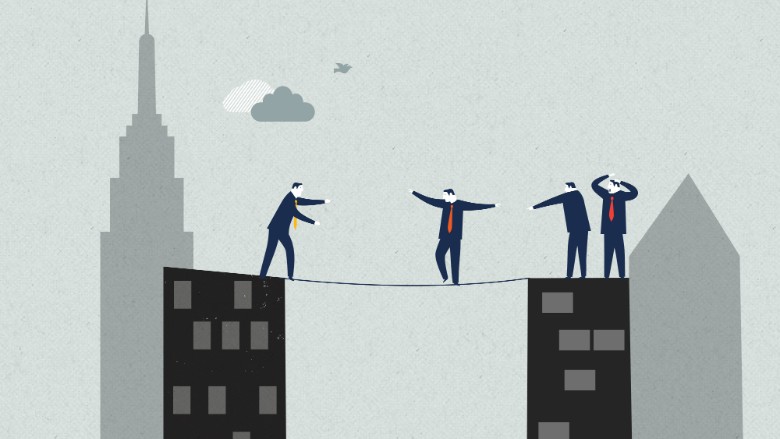
The American financial system is at risk.
That's the message from the International Monetary Fund, which on Tuesday released its first check-up on the U.S. financial system since 2010.
The IMF believes the U.S. is safer than it was before the financial crisis. However, new threats to the system -- like big banks that have grown even bigger -- have formed over the past few years and efforts to safeguard the system have not been finished.
"Before the memory of the crisis begins to fade, it will be important to complete the reform agenda and resist attempts to overturn previously agreed measures," the IMF's executive summary reads. The IMF listed 31 key recommendations for America.
Related: One more try for a Greek deal as time runs out
IMF critical of America: The report marks the latest criticism of American officials by IMF. Last month, IMF head Christine Lagarde told the Federal Reserve it should wait until 2016 to hike rates and then the organization recommended that the U.S. central bank ditch its "dot plot."
But the new warning represents a bigger picture progress report on the risks that caused the 2008 financial crisis -- and the ones that could cause the next one.
"New pockets of vulnerabilities have emerged, partly in response to the continuing search for yield," the IMF's executive summary reads.
The key issues are:
Related: China crash poses bigger threat than Greece
1. Banks are still too big: One key concern is over how big Wall Street banks continue to grow. Two prime examples are JPMorgan Chase (JPM) and Wells Fargo (WFC), each of which have amassed huge sums of assets after absorbing rivals that were collapsing during the crisis.
"Large and interconnected banks dominate the system even more than before," the IMF warns.
There's also worry over the shadow banking industry. These non-banks, which include hedge funds, asset managers and insurers, now account for more than 70% of assets and contribute to systemic risk.

Related: Nearly 25% of Chinese stocks have stopped trading
2. Risks loom in the stock and bond markets: Meanwhile, extremely low interest rates have encouraged investors to make riskier and riskier bets. The IMF called out the surge in junk bond issuance by U.S. companies and signs of "overvaluation" in some corners of the bond market. That may be putting it lightly as many investors worry about an all-out bubble in the bond market.
The IMF echoed concerns raised by others about declining market liquidity that could freeze trading during market turbulence.
Even the U.S. stock market may be flashing warning signs. Stock prices are "approaching levels that may be hard to sustain given profit forecasts" and eventual Fed rate hikes, the IMF warned. Moreover, there are "spillover risks" tied to how the global financial system has only become even more interconnected in recent years.
Another hazard could be developing in the student loan market, which has tripled over the past decade to $1.2 trillion. Surging student loan debt "suggests this could become an important contingent liability for the government," the IMF said. Plus, borrowers drowning in student debt could be cut off from mortgages and other forms of credit.
Related: Dr. Doom: This 'time bomb' will trigger the next financial collapse
3. Reforms not fully implemented: So what's the government doing about these dangers? Not enough, according to the IMF.
While "welcome steps have been taken" to bolster the system, more work needs to be done, the report said.
For example, the Dodd-Frank Act still has not been completed or fully implemented even as its five-year anniversary approaches.
The IMF also warned that the regulatory landscape "remains fragmented resulting in gaps, overlaps and the potential for delayed responses to emerging risks."
Related: Who gets hurt if the startup bubble bursts?
4. What about Fannie & Freddie? Progress has been made in addressing the Too-Big-To-Fail problem, but regulators need to put in place new standards for non-banks like asset managers and insurers.
One of the biggest pieces of unfinished business remains Fannie Mae and Freddie Mac. The U.S. government still controls these key housing financiers, creating fiscal and financial risks, the IMF said.





